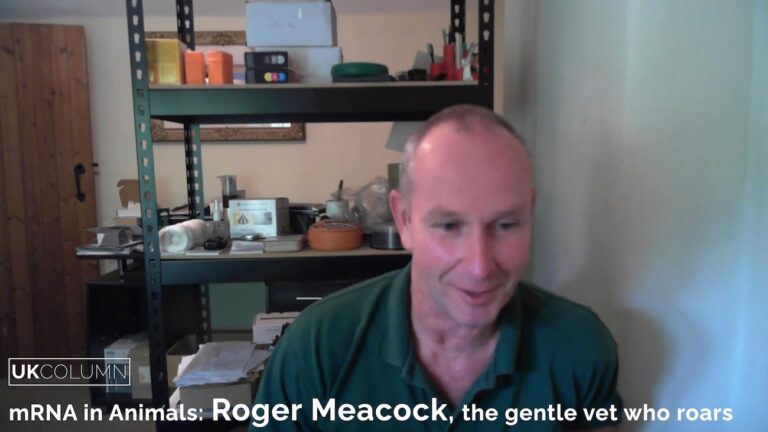As the new phenomenon of mRNA injections in humans takes the world by storm, how many of us have ever wondered what is happening in the animal kingdom: are mRNA vaccine platforms being introduced in animals as we have been led to believe, and are the stories of mRNA contamination through meat really what they seem?
Roger Meacock BVSc MRCVS is a consultant veterinary surgeon and one of a kind. In the veterinary world and in the world of human medicine, the phrase “do no harm” means just as much. He has been at the forefront of quantum veterinary medicine in the UK for the past 25 years and is referred to by many as “the one and only” or “the last chance vet”. Roger Meacock goes a step further and often sees animals that are too sick to be treated with existing medicine. He never promises the impossible but if he thinks he can help he usually does. Contact his practice. Natural Healing Solutions.
As the COVID-19 pandemic began, the more Meacock learned about the “science” the government was asking people to give, the more uneasy he became. When mRNA vaccines started hitting the headlines as the new miracle the world was waiting for, he quickly spotted the warning signs. The use of mRNA platforms in animal testing dating back to the 1990s had been a total disaster. ContinuityA new mRNA vaccine for pigs, made by Merck, has suddenly appeared on the market, a development that has Meacock worried: What impact will it have on the food chain for animals and humans?
Meacock and his colleagues Dr. Kevin McEachern Co-author Letter of concern To Veterinary Medicine Department (VMD). VMD is the UK's veterinary regulatory authority. Medicines and Health Products Regulatory Agency The UK Veterinary Medicines Administration (MHRA) is responsible for regulating medicines for human use. The VMD's aim is to protect public health, animal health and the environment, and promote animal welfare by ensuring the safety, quality and effectiveness of veterinary medicines. Like the MHRA, the VMD has stakeholders and contracts with a range of service providers.
VMD is Department for Environment, Food and Rural Affairs Defra is a ministry we have previously covered in our UK column. VMD's CEO is Abigail SegerThe Chief Veterinary Officer of the UK is Professor Christine MiddlemasOne of Professor Middlemas's concerns is antibiotic resistance, which she says Ms Sally Davies, UK Special Envoy for Antimicrobial Resistance.
In this interview, Roger Meacock reveals the truth about the use of mRNA injection platforms in animals and his serious concerns about the impact it has on animals and the role it plays in the food chain. How many animals are receiving mRNA injections and how do veterinarians view it? Meacock also Prion diseases And how it relates to “Mad Cow Disease” (BSE) and to human disease (Variant CJD). Is there a potential link to mRNA technology? As Meacock emphasizes, his suspicion that there is a link is not foolproof. But until the proper studies and investigations are carried out, we will never know.
There is an important difference between administering mRNA injections to humans and food animals. Humans are expected to live for decades (so slow-growing degenerative diseases take much longer to manifest). However, the situation for animals is different: in the UK, around 2.6 million cattle, 10 million pigs, 14.5 million sheep and lambs, 80 million fish and 950 million birds are slaughtered for human consumption each year.
From a veterinarian's perspective, we consider the concerns and dangers surrounding mRNA “medicines.” What does Meacock see in his eyes? Perhaps a detail that human medicine physicians are missing? What role might the mRNA platform play in the future of veterinary medicine?
This is the first in a series of interviews with the harmless, gentle vet Roger Meacock – be sure to check out the UK Column website as topics on the discussion with him will include pets, livestock farming, microchipping, the future of veterinary medicine and the impact of 15-minute cities on animals.


